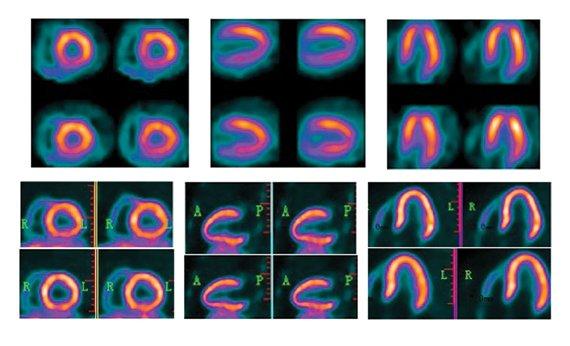September 6, 2013 — For patients with degenerative cervical myelopathy, imaging with 18F-FDG positron emission ...
PET Imaging
Positron emission tomography (PET) is a nuclear imaging technology (also referred to as molecular imaging) that enables visualization of metabolic processes in the body. The basics of PET imaging is that the technique detects pairs of gamma rays emitted indirectly by a positron-emitting radionuclide (also called radiopharmaceuticals, radionuclides or radiotracer). The tracer is injected into a vein on a biologically active molecule, usually a sugar that is used for cellular energy. PET systems have sensitive detector panels to capture gamma ray emissions from inside the body and use software to plot to triangulate the source of the emissions, creating 3-D computed tomography images of the tracer concentrations within the body.
September 3, 2013 — Researchers from University Hospitals Case Medical Center have published findings that a new form of ...
August 7, 2013 — A more precise method for determining bone marrow involvement in patients with diffuse large B-cell ...
Digital technology is opening remarkable opportunities for clinical positron emission tomography (PET) about which ...
July 29, 2013 — GE Healthcare has initiated a Class I recall of most of its SPECT nuclear imaging systems and called for ...
Coronary artery disease (CAD) is a major cause of death in modern industrialized countries. Assessments of regional ...
Just when positron emission tomography (PET) appears to be eclipsing single photon emission computed tomography (SPECT) ...
Precision can have an enormous impact on patients. From diagnosis to patient monitoring (see “How Digital PET/CT Can ...
July 12, 2013 — Biopharmaceuticals Inc. announced the first subject has been enrolled in its NAV4694 global, pivotal ...
July 11, 2013 — The Society of Nuclear Medicine and Molecular Imaging (SNMMI) and the Alzheimer Association have ...
The Society of Nuclear Medicine and Molecular Imaging (SNMMI) is disappointed in the draft Medicare decision from the ...
PET is getting ready to venture outside oncology, cardiology and mainstream neurology. High on the list of new clinical ...
Peter Herscovitch, M.D., SNMMI president-elect, explains the advances in molecular imaging for Alzheimer's disease and ...
June 20, 2013 — A relatively new weapon in the fight against childhood brain cancer has emerged that improves upon ...
June 19, 2013 — Alzheimer’s disease has been linked in many studies to amyloid plaque buildup in the brain, but new ...
Analog is approximate. Digital is specific. Therein lies the fundamental difference between digital PET and its analog ...
June 19, 2013 — Coronary artery disease (CAD) is one of the world’s most prevalent and silent killers. Positron emission ...
June 19, 2013 — Researchers have yet again been sent back to the drawing board in the development of the much-sought ...
June 19, 2013 — Using positron emission tomography (PET) imaging of the brain, researchers have identified a sweet spot ...
When prostate cancer makes a comeback, it becomes increasingly important to have exceptional imaging available to find ...
One of the biggest hurdles of hybrid positron emission tomography and magnetic resonance (PET/MR) imaging is the ...
The Society of Nuclear Medicine and Molecular Imaging’s 2013 Annual Meeting marks the unveiling of the successful ...
For patients with advanced breast cancer, positron emission tomography (PET) and magnetic resonance (MR) imaging can ...
June 13, 2013 — Mirada Medical collaborators presentnew positron emission tomography/magnetic resonance imaging (PET/MRI ...


 September 06, 2013
September 06, 2013 















